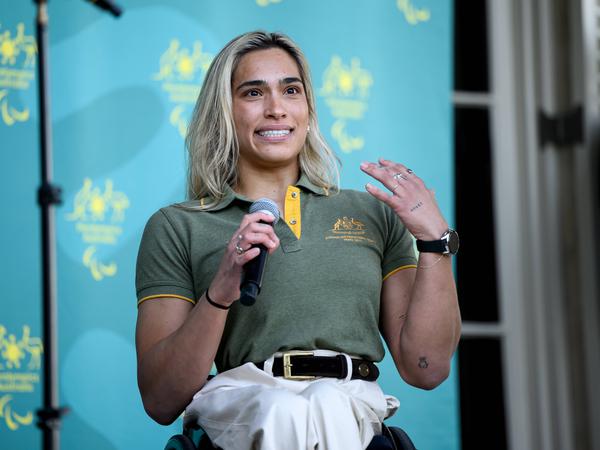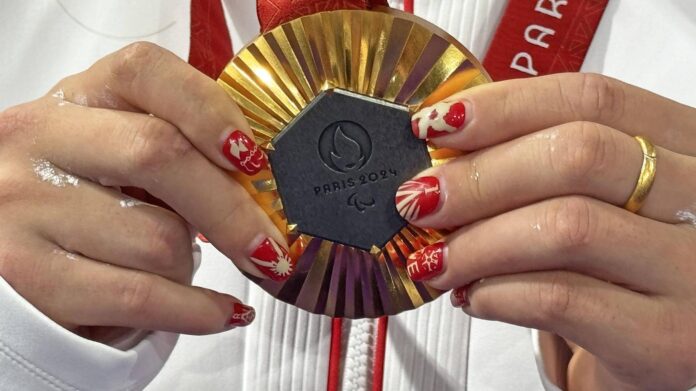Andrew Parsons, President of the International Paralympic Committee (IPC), opened his speech the Paralympics in Paris with the words: “Welcome to the most revolutionary sporting event in the world”. Place de la Concorde The Brazilian repeatedly stressed two things. Firstly, the games should initiate the “revolution of inclusion” in order to promote the integration of the 1.3 billion people with disabilities in the world.
And secondly, that the three French values of “liberty, equality, fraternity” should be thought of globally. Equality – on a financial level, an aspect that nations have only recently begun to approach on a sporting level.
The German Sports Aid Foundation describes itself as the “most important supporter of Germany’s young and top athletes.” Prizes totaling 2.1 million euros were planned for the Olympic and Paralympic Games in Paris.
A gold medal in individual sports is worth 20,000 euros for Germans, 15,000 euros for silver and 10,000 euros for third place. If you place fourth to eighth, you will receive between 5,000 and 1,500 euros – but only if you are an Olympian. At the Paralympics, third place is the limit.
However, payments will only be made if the athlete has already received financial support from Sporthilfe prior to the Games. Even the 20,000 euros is only a fraction of what some other countries are prepared to pay.
There is money in Asia, but not in Scandinavia
The highest bonuses are paid out in Asian nations such as Hong Kong, Singapore and Malaysia. Since the 2016 Summer Games in Rio, Malaysia has paid 1,000,000 Malaysian Ringgit and a monthly payment of 5,000 M$ for life for a gold medal. That is the equivalent of around 209,000 euros plus 1,050 euros, for silver there is around 62,000 euros and for bronze almost 42,000 euros.
The Brazilian state has also been paying its para-athletes since 2016. There has been an increase of 56.25 percent from the last games in Tokyo to today. This is “in line with the development of Paralympic sport in Brazil. It is a recognition,” said Mizael Conrado, president of the Brazilian Paralympic Committee in March. First place in the individual event receives 250,000 reals, around 40,200 euros, second place receives 100,000 R$ and third place receives 50,000 R$. In doubles and team competitions, half of this amount is paid out.
The big but: In Brazil, a distinction is made between the Olympics and the Paralympics. The bonus for Olympians is still higher – there can be no talk of equality.
Test passed
More and more countries are moving towards this for the 2024 Games. For example, host France has increased the original prize money and is now awarding 80,000 euros for gold, 40,000 euros for silver and 20,000 euros for a bronze medal.
We are not here for the money – but this support shows the public that athletes with disabilities are equal to non-disabled athletes.
Australian Para-athlete Madison de Rosario
Neighbouring Spain is investing even more. Pilar Alegría, the Minister for Education, Vocational Training and Sport, said in July that it was fair to equalise the medal bonuses. The Spanish government had increased the grant to the Paralympic Committee by more than 54 percent in order to “pay off this historic debt.” In her opinion, Paralympic sport had “already passed the test by far”. Now there would be “equal recognition for equal reward and equal work.” This amounts to 94,000 euros for first place, 48,000 euros for second place and 30,000 euros for third place.
On the other side of the world, the Australian federal government decided in August on uniform bonuses. They will apply provisionally to both the Summer Games in 2024 and the Winter Games in 2026, and will be funded by the Australian Olympic Committee. The President of Paralympics Australia, Alison Creagh, welcomed this announcement: “Our athletes are role models who inspire the nation (…) and face significant financial burdens if they want to succeed on the world stage.”
Madison de Rozario, the two-time gold medalist from Tokyo and flag bearer for Paris, also stressed: “We are not here for the money – but this support shows the public that athletes with disabilities are equal to non-disabled athletes.” The bonuses amount to 20,000 Australian dollars (around 12,200 euros), 15,000 AUD (around 9,200 euros) and 10,000 AUD (around 6,100) for the three podium finishers.

© IMAGO/AAP
This equality also exists in Canada. The “Paralympic Recognition Program” was presented there in January – it is largely financed by the foundation of a healthcare entrepreneur.
Canadian athletes appreciate it. “Today’s announcement is much more than just sports news,” said Aurélie Rivard, the 10-time medalist in para-swimming. Marc-André Fabien, president of the Canadian Paralympic Committee, called the move a “historic day for Paralympic sport in Canada.”
The Swedish Olympic Committee, on the other hand, does not pay bonuses to Olympians or Paralympians. Team manager Peter Reinebo believes that awarding scholarships is “far more important than medal bonuses for a select few” – much to the dismay of two-time Olympic champion Sarah Sjöström, who uploaded a video complaining in August. “Athletes who perform like this should be able to get a bonus,” she said. When asked, Niclas Grön, the Swedish Committee’s sports director, said he hoped and was working on making bonuses possible in the future.
The fact is that bonuses are not paid out by the International Olympic Committee based on a 128-year-old tradition. The same applies to the Paralympics. States decide individually whether or not to subsidize the performance of their Paralympians.
It cannot be denied that more prizes will be awarded in Paris than ever before. And also that other nations have aligned the payouts for both Summer Games. A step towards a “revolution of inclusion”. But whether this represents a fundamental and lasting structural change in the system remains to be seen.
